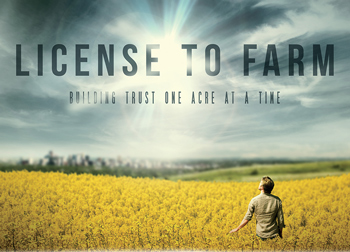 In the film, License to Farm, there’s a segment that acknowledges that most people’s view of farming is anchored in the past. Shots of the antique tractor collection at Saskatoon’s Western Development Museum and footage of a lovingly restored red McCormick tractor rolling through a parade emphasize this point.
In the film, License to Farm, there’s a segment that acknowledges that most people’s view of farming is anchored in the past. Shots of the antique tractor collection at Saskatoon’s Western Development Museum and footage of a lovingly restored red McCormick tractor rolling through a parade emphasize this point.
Two or three generations ago, few farmers needed to tell anyone how they grew food. In 1931, when the government first compiled statistics on rural Canada, more than 45 per cent of the population were either farmers or part of the communities that supported farmers.

But then technology happened. Farmers switched from pulling implements with horses to using tractors and ever-more-sophisticated machinery. As less labour was needed to work the farms, people moved to the city. By 2011, the farm population comprised a mere two per cent of Canadians. Few people today have direct experience or knowledge of what it takes to run a successful farm.
Many city dwellers may have ancestral memories of farming, but it’s an image of days long past: Grandpa in his straw hat and bib overalls, loading the press drill behind that red McCormick tractor, with a five-gallon-pail full of seed he saved from the previous year’s crop; Grandma milking the family cow and gathering eggs every morning to feed a gaggle of kids.
It’s a pleasant, nostalgic image when experienced after the fact and far away, secure in the comfort of a modern city home. But it’s an image that leaves out details, such as those kids going out to the fields to pull weeds, dusk-to-dawn work to care for animals and gardens, then slaughter and preserve meat, harvest, preserve, and store vegetables. It leaves details such as Grandpa’s first task on a winter morning: lighting the fire in the stove in a house grown so cold overnight that water in the bucket was frozen over.
Modern farming is perhaps no less work, but in many ways much more comfortable – and productive – than the idealized version. It’s also alien to most people.
 The cab of a modern combine can resemble the cockpit of an airliner in its complexity. On-board computers display precise maps of a field, overlaying yield data with input data, allowing a farmer to plan next year’s crop while completing the harvest. In the spring, similar systems allow seed and fertilizer to vary over the field as needed, saving input costs and reducing environmental impact, such as runoff from excess fertilizer.
The cab of a modern combine can resemble the cockpit of an airliner in its complexity. On-board computers display precise maps of a field, overlaying yield data with input data, allowing a farmer to plan next year’s crop while completing the harvest. In the spring, similar systems allow seed and fertilizer to vary over the field as needed, saving input costs and reducing environmental impact, such as runoff from excess fertilizer.
Technology – specifically biotechnology – has also revolutionized crop development. For example, farmers love GMO (genetically modified organism) crops. They have adopted them faster and more broadly than any other agricultural innovation in history, because they allow crops to be grown more easily and with less environmental impact. But some non-farmers hate GMOs, launching vociferous campaigns against their use – even for humanitarian purposes.
At the same time, the growth of farmers’ markets, and marketing buzzwords like “organic” and “natural,” are well-received by the food-buying public. Such words conjure up the wholesome, nostalgic image of Grandpa in his bib overalls, and Grandma in her gingham dress.
It’s a familiar image, a comforting one, but also out of date – and it threatens modern farming. Urban people, several generations removed from the farm and with an outdated view of how their food is produced, are vulnerable to misinformation and scare tactics.
Farmers are a fiercely independent bunch, but License to Farm warns that activists are working to take away this independence. Farmers are in danger of losing the freedom to manage their land in the way they choose, using what they deem the best tools for the job according to their experience and expertise.
But the same technologies that allow farmers to check commodity prices from their laptops on the combine give them the tools to make their voices heard. Through social media, blogs, posting brief video “ride alongs” from their cell phones, they can speak directly to their urban cousins. They need not let silence take away their “license to farm.”
Michael Robin is a Saskatoon-based freelance writer.
Photo: Ag-West Bio